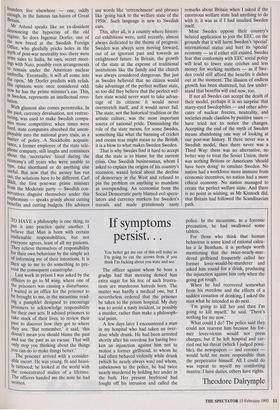If symptoms
persist.. .
TO HAVE a philosophy is one thing, to put it into practice quite another. I believe that Man is born with certain inalienable responsibilities, but not everyone agrees, least of all my patients. They relieve themselves of responsibility for their own behaviour by the simple act of informing me of their intentions. It is then up to me to do something to pre- vent the consequent catastrophe.
Last week in prison I was asked by the officers to go to M wing, where one of the prisoners was causing a disturbance. I waited in an office for the prisoner to be brought to me, in the meantime read- ing a pamphlet designed to encourage prisoners to acknowledge responsibility for their own acts. It advised prisoners to take stock of their lives, to review their past to discover how they got to where they are. 'But remember,' it said, 'this doesn't mean you should blame the past and use the past as an excuse. That will Only stop you thinking about the things You can do to make things better.'
The prisoner arrived with a consider- able escort. He was young, fit and heavi- ly tattooed; he looked at the world with the concentrated malice of a lifetime. The officers handed me the note he had written.
You better get me out of this cell today as I'm going to cut the screws frote if you think I'm fucking about you wate and see.
The officer against whom he bore a grudge had that morning denied him extra sugar for his tea: of such frustra- tions are murderous hatreds born. The matter was hardly a medical one, but I nevertheless ordered that the prisoner be taken to the prison hospital. My duty was to avoid a nasty incident, or possibly a murder, rather than make a philosoph- ical point. A few days later I encountered a man in my hospital who had taken an over- dose while drunk. He had been arrested shortly after his overdose for having bro- ken an injunction against him not to molest a former girlfriend, to whom he had often behaved violently while drunk (which he nearly always was) and whom, unbeknown to the police, he had twice nearly murdered by holding her under in the bath. Her present boyfriend had fought off his intrusion and called the police. In the meantime, as a forensic precaution, he had swallowed some tablets.
For those who think that human behaviour is some kind of rational calcu- lus a la Bentham, it is perhaps worth mentioning that the twice-nearly-mur- dered girlfriend frequently called her former lover-would-be-murderer and asked him round for a drink, producing the injunction against him only when the going got rough.
When he had recovered somewhat from his overdose and the effects of a sudden cessation of drinking, I asked the man what he intended to do next.
`I'm going to kill her and then I'm going to kill myself,' he said. 'There's nothing for me now.'
What could I do? The police said they could not rearrest him because his for- mer lover-victim would not press charges; but if he left hospital and car- ried out his threat (which I judged possi- ble), the newspapers — and coroner would hold me more responsible than the perpetrator himself. All I could do was repeat to myself my comforting mantra: I have duties, others have rights.
Theodore Dalrymple


















































 Previous page
Previous page